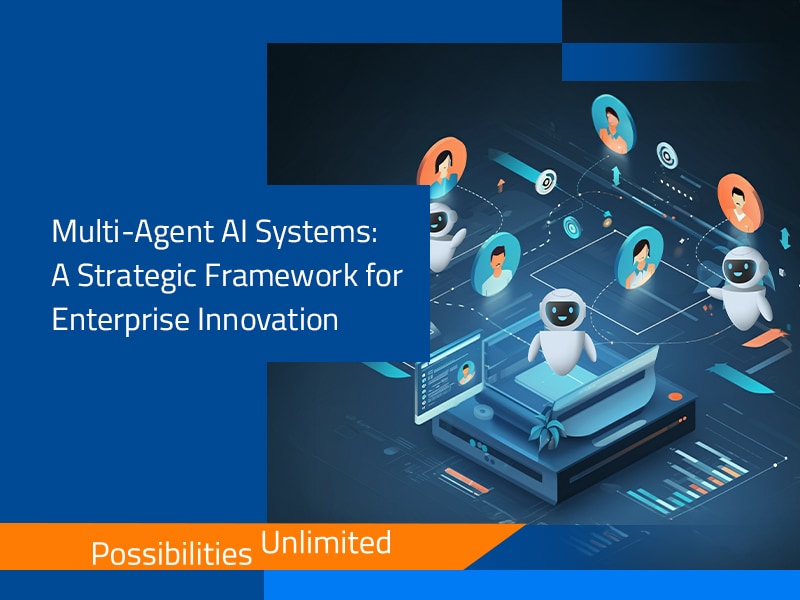Home > Blogs > Beyond the Bot: Why Enterprises Must Embrace the Agentic AI Revolution
Beyond the Bot: Why Enterprises Must Embrace the Agentic AI Revolution

Table of Contents
The Rise of AI Agents
* Podcast is AI Generated Content
A decade ago, enterprises across the globe marveled at how Robotic Process Automation (RPA) bots could replicate human keystrokes, eliminate mundane tasks, and deliver rapid ROI. These digital workers transformed back-office operations virtually overnight. It was revolutionary—but it was just the beginning.
In our previous blog, we explored traditional RPA’s valuable contributions while acknowledging its limitations in our increasingly complex business landscape. Today, forward-thinking enterprises stand at a critical inflection point. The transition from rule-following bots to intelligent, adaptable AI agents represents not just an incremental improvement but a fundamental reimagining of how work gets done—and organizations that fail to make this leap risk being left behind.
The Transformative Power of Agentic AI
Imagine your enterprise automation as a finely tuned orchestra. Traditional RPA bots are like skilled musicians, meticulously playing their individual parts from a fixed score. They excel within their defined limits, but cannot improvise, adapt to unexpected tempos, or compose new melodies.
Now imagine replacing these musicians with virtuosos who not only play their parts flawlessly but can improvise when needed, listen and adapt to the entire orchestra, suggest creative interpretations of the music, and even compose new sections on the fly—all while the entire process is automated end-to-end, and maintaining the composer’s original intent. This is the leap from RPA to Agentic Process Automation (APA).
For enterprises, this transformation means far more than incremental efficiency gains. Agentic AI delivers intelligent, adaptive systems that can understand business context, make complex decisions, and continuously optimize operations without constant human intervention. These capabilities enable organizations to fundamentally reimagine their operations, creating more resilient, responsive, and innovative business models that can thrive amid rapidly changing market conditions.
Key Advantages of Adopting APA
Enterprises transitioning from RPA to APA expect several transformative benefits:
Expanded Automation Scope
Autonomous Adaptability
Unlike rule-based RPA, agentic systems can navigate changing conditions, variable inputs, and unexpected scenarios without constant reconfiguration.
Complex Decision-Making
APA can evaluate multiple factors, weigh alternatives, and make nuanced decisions aligned with business goals – moving beyond the binary logic of traditional automation.
Self-Learning
These systems continuously improve through experience, refining their approaches based on outcomes and feedback loops.
End-to-End Process Orchestration
Generative AI enables these systems to understand the intent behind processes rather than just following scripts.
Optimal workload balancing across human and AI resources ensures work is directed where it can be most efficiently handled.
Enhanced decision-making capabilities allow for more intelligent routing, prioritization, and handling of complex cases.
Flexibility to adapt to business and environmental changes without complete reprogramming.
Breaking Down Operational Silos
Enabling seamless collaboration between AI agents across departmental boundaries.
Allowing for dynamic adjustments to workflows based on real-time conditions.
Optimizing processes continuously based on emerging trends and compliance requirements.
Creating a unified automation fabric that spans the enterprise.
Enhanced Resilience and Reliability
Predicting potential failures before they occur.
Taking corrective actions autonomously when issues arise.
Finding workarounds or alternate paths when standard routes are blocked.
Learning from past failures to prevent recurrence.
Optimizing processes based on feedback loops.
Superior ROI and Compliance
Significantly greater scale of automation coverage across the enterprise.
Reduced exception handling and maintenance costs.
Better compliance through consistent application of policies and documentation.
Improved customer and employee experiences through more intelligent interactions.
Higher throughput and faster processing times for complex workflows.
Future-Proofing the Organization
Building the foundational capabilities for next-generation business and operational models.
Developing institutional knowledge about effectively deploying and managing AI agents.
Creating an environment where human workers can focus on truly high-value activities.
Enabling greater business agility and responsiveness to market changes.
The Platform Advantage: Powering Agentic Process Automation
Realizing these benefits requires a unified platform approach, like EdgeVerve AI Next, streamlining AI adoption and ensuring long-term success. This approach minimizes project overruns, accelerates deployments, and delivers consistent outcomes through:
A platform approach is your strategic hedge against technology’s ceaseless evolution—ensuring that no matter which AI trend takes center stage, you’re ready to integrate, iterate, and innovate.
The Enterprise Imperative: Act Now or Risk Being Left Behind
The transition from RPA to APA isn’t just another technology upgrade—it represents a fundamental shift in how enterprises operate, compete, and create value. Businesses that recognize this shift and act decisively will find themselves with a powerful advantage, while those that hesitate may discover that the gap between themselves and AI-powered competitors has become insurmountable.
The question for enterprise leaders is no longer whether to embrace agentic AI, but how quickly and strategically they can integrate it into their operational fabric. This doesn’t mean abandoning existing RPA investments—rather, it means enhancing and expanding them into an intelligent, adaptive automation ecosystem that can respond to the increasing complexity and pace of today’s business environment.
The enterprises that will thrive in this new landscape are those already building the organizational capabilities, technology infrastructure, and strategic mindset needed to harness agentic AI’s full potential. They understand that while RPA was about efficiency, APA is about transformation.
In our next blog, we’ll explore practical implementation strategies for organizations ready to begin their journey from traditional RPA to agentic automation, including key considerations for technology selection, process prioritization, and change management approaches that minimize disruption while maximizing value.
Ready to orchestrate your enterprise’s AI transformation?
Discover how EdgeVerve AI Next can help you seamlessly transition from Robotic Process Automation to Agentic Process Automation and lead the AI revolution.



Shrikant Deo
Director - Product Management, EdgeVerve
More blogs from Shrikant >